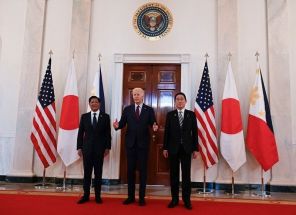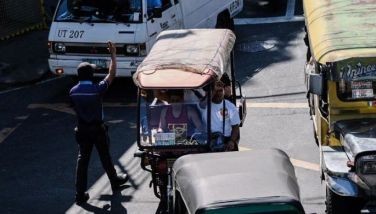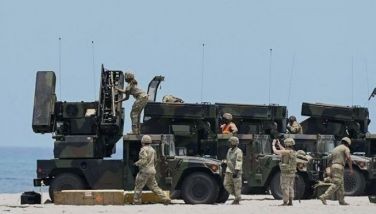Palace pins blame on Napeñas
MANILA, Philippines - Sacked Special Action Force (SAF) chief Director Getulio Napeñas failed to follow orders to coordinate the operation to arrest two terrorists in Mamasapano, Maguindanao last Jan. 25, Malacañang reiterated yesterday.
Presidential spokesman Edwin Lacierda pointed out in a news briefing that, based on facts gathered in the inquiry, the Mamasapano operation might not have ended in tragedy had Napeñas coordinated its implementation with his superiors.
Lacierda added that hard questions have to be asked in the inquiries being conducted, and these require answers.
He said President Aquino had ordered Napeñas to coordinate the operation with Philippine National Police (PNP) officer-in-charge Deputy Director Leonardo Espina.
“That wasn’t followed, and that’s borne out by the testimony of Gen. Napeñas,” Lacierda said.
He cited meetings held at the Bahay Pangarap where the President and security officials were briefed about the mission called Oplan Exodus.
Aquino, in his televised address last Jan. 28, noted Napeñas’ “very minimum compliance” with procedures required in the operation.
“Obviously, time on target requires you to coordinate with your counterparts before the operation but based on the facts that have been laid out, the coordination happened after the firefight occurred,” Lacierda observed.
“The point also is, the President instructed clearly for him to coordinate. Why was it not followed on the basis of time on target? You’ve got six full hours to coordinate a time on target before the operation to hit Marwan happened,” he said.
Lacierda emphasized Aquino was “in possession of actionable intelligence” which prompted him as commander-in-chief to call for a briefing on the SAF operation.
He also repeated the line of Justice Secretary Leila de Lima that Aquino is free of any liability even if he had consulted then suspended PNP chief Alan Purisima, as no law prohibits the Chief Executive from talking to anyone familiar with the operation.
No chain of command
Lacierda also said the chain of command applies to the military and not to the PNP which, based on the Constitution, “is civilian in character.”
Quoting De Lima, Lacierda said there was no violation of the chain of command, or of “ lines of authority or command responsibility.”
“And let us remember also that the President is the Chief Executive of the executive branch. The Philippine National Police is with the executive branch. He acts as the chief executive of a civilian agency, like any department, so he has control and supervision over each and every department or agency within the executive branch,” Lacierda said.
He also downplayed the reported rift between the PNP and the Armed Forces of the Philippines over the Mamasapano incident, saying what had transpired simply resulted from lack of coordination.
Purisima also said in the joint hearing of the House committees on public order and safety, and on peace, reconciliation, and unity that, strictly speaking, the concept of chain of command does not exist in the civilian PNP.
He said that while he had indeed planned and ran the operations to arrest Malaysian terrorist Julkilfi bin Hir, alias Marwan, and Filipino bomb-maker Basit Usman, he relinquished his involvement upon his suspension by the Office of the Ombudsman last Dec. 4 over corruption allegations.
Purisima had drawn flak for instructing Napeñas to inform Espina and Interior Secretary Manuel Roxas II of the operation only after it had been launched.
Fully authorized
He said Napeñas had the authority to implement and supervise the operation under Republic Act 6975 or the PNP Law and other regulations.
“When the continuing law enforcement operations of the PNP SAF to implement the warrants of arrests against Marwan and Usman were approved, the chief PNP delegated to (Napeñas) the necessary control and supervision over the mission,” Purisima told the joint inquiry.
“The director of the PNP SAF is handling the operation as the one on top of the chain of command for that mission,” he said.
“Contrary to prevailing accounts and perceptions, the PNP command line was not broken at any time during the mission. The force commander (Napeñas) continued to exercise the delegated power of the chief PNP, which was never affected by my preventive suspension,” he said.
He said also under the PNP Law, the secretary of the interior is not part of the chain of command but has administrative supervision over the police force through the National Police Commission.
He said this explains why Napeñas informed Roxas and Espina of the operation only at “time on target” or when the mission was already in motion.
“It is within this context that all my actions were taken, although my preventive suspension prevented me from performing the administrative functions of a chief PNP, it did not prevent me from providing advice, inputs and reminders to (Napeñas),” Purisima said.
In the same hearing, Napeñas reiterated he met Purisima and PNP Intelligence Group chief Senior Supt. Fernando Mendez last Jan. 9 at Malacañang where they briefed President Aquino on Oplan Exodus.
He said under Oplan Exodus, the coordination with the Armed Forces would be done only after the launching of the operation so as to void leaks.
Napeñas said there was no explicit order from Aquino not to disclose the mission so there was no reason to say that the latter broke the chain of command. -With Paolo Romero
- Latest
- Trending





























